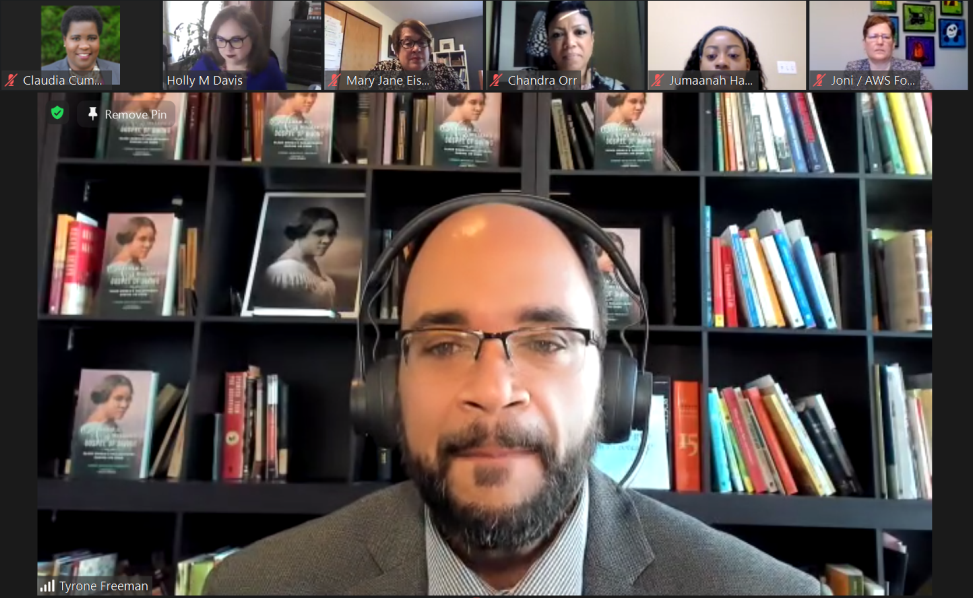Inaugural Class Convenes for Mutz Philanthropic Leadership Institute

The inaugural class of the Mutz Philanthropic Leadership Institute convened virtually for a two-part opening session on January 21-22, 2021. After getting to know one another, the class was treated to Dr. Tyrone Freeman, IU Lilly School of Philanthropy professor and author of the new book Madam CJ Walker’s Gospel of Giving: Black Women’s Philanthropy during Jim Crow. Dr. Freeman spoke with the class about changing the face of philanthropy. In looking at the past, present, and future of generosity using Madame C.J. Walker as a case study, the class got to consider the history of philanthropy from a completely different lens than what is traditionally presented through the “robber baron” narrative.
Dr. Freeman shared that there are many different ways to come to philanthropy beyond amassing a fortune and waiting until the end of one’s life to give it away. Dr. Freeman highlighted the philanthropic spirit of the African American community, often portrayed as the recipients of philanthropy, but rarely showcased as the “givers” despite their deep philanthropic roots. He cited modern movements born out of black philanthropic traditions, including #MeToo, Black Lives Matter, and the designation of August as African American Philanthropy Month. Madame C.J. Walker did not wait to engage in philanthropy until she was rich. She gave in proportion to her income as she went along in her career. She not only used her money, but she also used her voice, her networks, and her fame to engage in philanthropy. “Philanthropy does not come from wealth, it comes from generosity,” concluded Dr. Freeman.
The class next spent some time with program namesake John Mutz. After viewing his speech entitled The Role of Philanthropy in an Enduring Democracy, Mutz took questions from the class on a variety of topics, including his early beginnings in elective office, time at the Lilly Endowment Inc. and Lumina Foundation, and thoughts about the future of philanthropy. Mutz will be in and out of class sessions throughout the program, giving the class many opportunities to interact with and learn from one of the key figures in so many substantial innovative projects and policies in Indiana’s last 60 years.
The second day of the opening session began with an interactive talk with Dr. Sara Konrath, a social psychologist who directs the Interdisciplinary Program on Empathy and Altruism Research (iPEARlab.org) at the Indiana University Lilly Family School of Philanthropy. Her research explores traits, motivations, and behaviors related to giving. Dr. Konrath led the class through her research, including statistics on volunteering, giving, and the types of givers. Her work included demographic information as well as personality traits. The class engaged in discussions about how they would use this knowledge to approach donors. For instance, Dr. Konrath shared that donors who are narcissists are less likely to give if you focus on all the good things their money could do. Instead, she suggested focusing on the perks the donor might receive, like their name on a building.
We wrapped up our first session with a talk from IPA consulting favorite, Tony Macklin. Macklin led a discussion on current and future trends in philanthropic giving and the role transformational and innovative leaders might have in redefining giving. Macklin shared how a declining trust in nonprofits and volunteerism impacts charitable giving, including the use of Donor Advised Funds (DAFs), crowdfunding, and impact investing. The class engaged in discussion around the best roles for private, philanthropic, and citizen sectors, and examined whether wealth should necessarily mean power. Macklin asked the class what their roles, as philanthropoids, should be.
With this solid foundation, the class will head into their February class session prepared to tackle the structure of philanthropic organizations and we will see the return of John Mutz, author of Fundraising for Dummies, return for a discussion on asset development.
